When seconds count, AirCare brings blood to critically ill patients
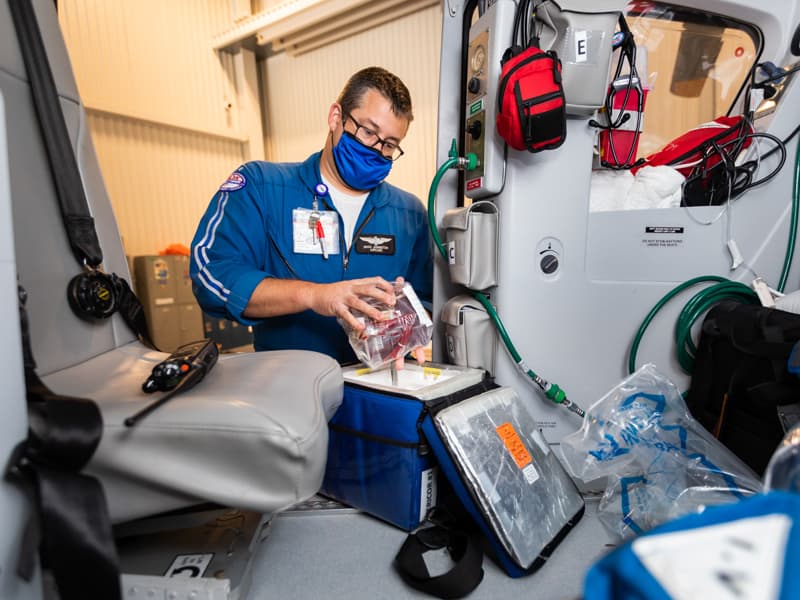
When a northeast Mississippi elementary-schooler was accidentally shot in the abdomen several years ago, his profuse bleeding was life threatening.
Mike Mims, a critical care paramedic and registered nurse who flies on AirCare, the University of Mississippi Medical Center’s medical helicopter transport program, knew the child didn’t have much time.
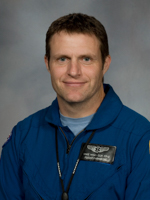
“An adult can lose a lot of blood, but kids don’t have a lot of blood to begin with,” said Mims, a 15-year AirCare veteran who cares for thousands of patients from the Columbus base of the state’s most advanced medical transport program.
Complicating the emergency was the scarcity of blood at the small rural hospital where the child was taken pending the arrival of AirCare, which flew him to UMMC’s children’s hospital in Jackson. “Small hospitals often have a limited amount of blood on hand to begin with,” Mims said.
“That’s why we bring our own.”
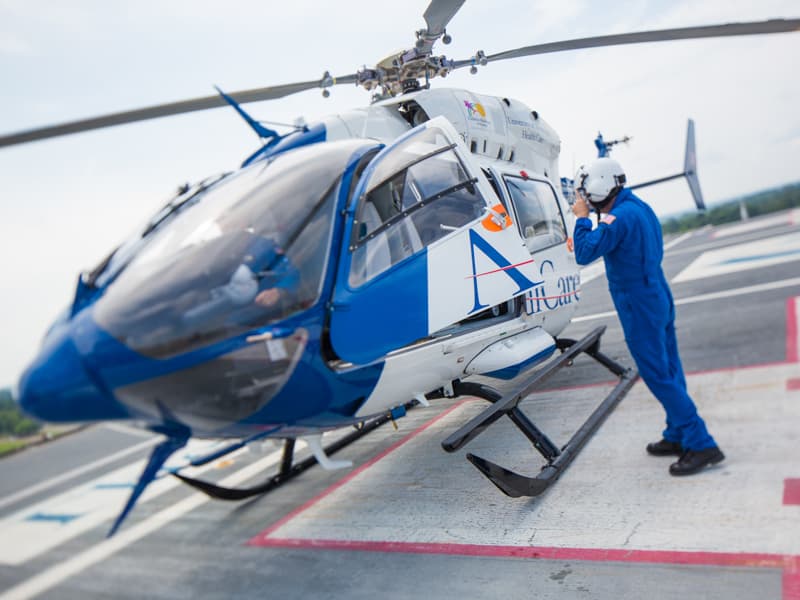
In 2019, AirCare’s critical care paramedics and registered nurses transfused over 440 units of red blood cells and plasma into victims of traumatic injuries or people experiencing internal bleeding caused by illness. Mississippi Blood Services supplies blood and blood products to UMMC and most hospitals in the state.
With bases in Jackson, Greenwood, Columbus and Meridian, AirCare next year will celebrate its 25th anniversary. AirCare transfuses the significant majority of blood and blood products flown by medical air transports operating in Mississippi, said Merle Eldridge, MBS’ director of donor recruitment and mobile collections.
Eldridge recently received a briefing on AirCare’s use of blood and plasma from Dr. Damon Darsey, associate professor of emergency medicine and medical director for UMMC’s Mississippi Center for Emergency Services.
“Even after six years at MBS, I was taken aback by the number of units actually used in the air,” Eldridge said.
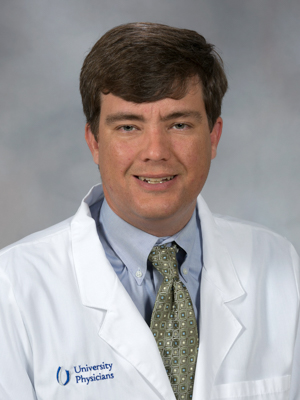
“As we are seeing through military and trauma studies, the changing evidence is pointing to more and more aggressive blood-based resuscitation of trauma and medical cases where bleeding is a concern,” Darsey said.
Each AirCare helicopter carries between two and four units of O-negative red blood cells, depending on need. O-negative is called the universal donor blood because anyone can safely receive it, regardless of their blood type. They are generally transfused in flight, although sometimes in rural Mississippi, it could happen before AirCare lifts off.
“A lot of times, we bring blood to the hospital where we are picking up a patient, and the staff says, ‘Thank God, you brought blood,’” Mims said. “They might have already given the patient all they had.”
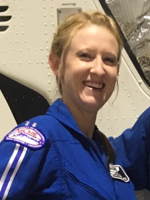
“We’ve given blood to people who are still in their vehicles after an accident, waiting to be extricated,” said ShyAnn King, a registered flight nurse who flies out of AirCare’s Greenwood base.
Blood doesn’t just replace lost volume, King said. It carries precious oxygen the body must have to breathe, something you don’t get from a saline drip.
“If you are bleeding out the red stuff, you need the red stuff,” King said. “And people don’t just bleed out red cells. We replace their plasma so that their blood will have the ability to clot.”
Giving patients blood in the field can make all the difference in their recovery. “Because of the body’s need for oxygen, how fast an injured or sick person’s blood is replaced is critical,” Mims said.
“We may have our patients less than an hour,” Mims said. “They might be OK when we get them to the hospital, but days later, they could have a brain injury because they suffered a lack of oxygen. So, it sets up the hospital staff for success if you can give the patient blood in the beginning.”
Although trauma patients generally receive the lion’s share of blood and blood products on AirCare, what’s not so visible are the injuries or illnesses that also can produce major blood loss.
“Some of our patients have experienced blunt trauma to their abdomen, liver, spleen or intestines,” Mims said. “Our elderly population is prone to having intestinal bleeds.”
A bleeding event becomes even more potentially deadly if the patient is on blood thinners. UMMC’s arsenal of caregiver expertise has a second weapon for those situations, drugs that stop or significantly slow the loss of blood, and help the patient retain what’s being transfused.
One is a medication carried on board very few medical air transports nationally: prothrombin complex concentrate, often referred to by the trade name Kcentra. It’s used in urgent situations to reverse anticoagulant drugs in a patient’s system. It’s reserved for acute major bleeding that occurs during trauma or urgent surgery on those traumatically injured.
The other is tranexamic acid, or TXA, commonly used to reduce bleeding by stabilizing the body’s response to trauma and blood clotting.
AirCare is the only medical helicopter transport operating in the state that stocks and administrates Kcentra. It and TXA both have the same goal, but they work differently in the body to stop bleeding.
That drug combination helped save the life of Eupora resident Ray Gustafson in July 2017. Gustafson, a diabetic who takes anticoagulant drugs to keep his blood from easily clotting, suffered massive bites in his calf delivered by his donkey, Bobo.
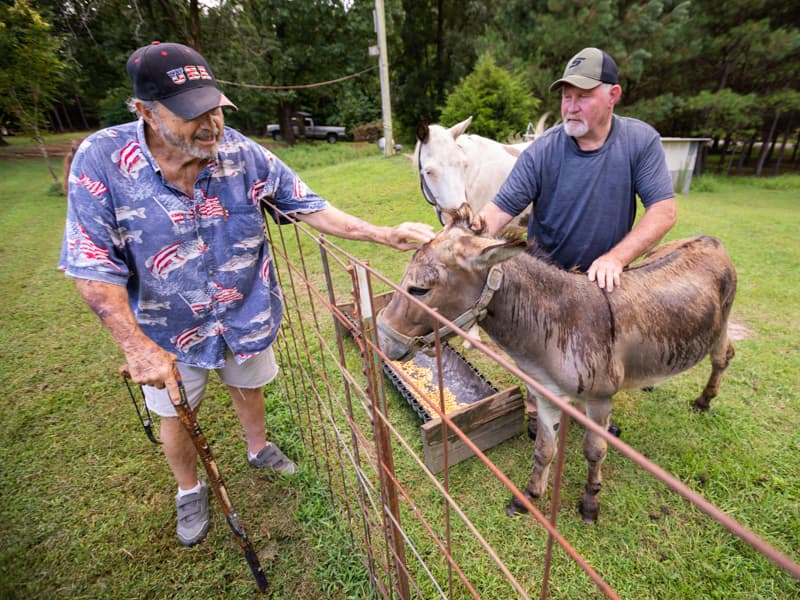

“If we had not had those two drugs, and the blood and plasma, I don’t think he would still be here,” said AirCare critical care paramedic Brad Harper, who with fellow critical care paramedic Don Moore treated and transported Gustafson.
Ken Smith, an AirCare registered flight nurse stationed at the Meridian base, remembers flying a woman in her 40s who was experiencing profuse internal bleeding.

“She had cancer and she was hemorrhaging. We were thinking out of the box on what we could do for her, and we gave her Kcentra, TXA and all of our blood,” Smith said. “We called the attending physician at UMMC while we were in flight. This patient ended up having a good outcome.”
Anderson Regional Medical Center in Meridian and UMMC have a regional health-care affiliation that’s enhanced by AirCare’s services. The two hospitals recently implemented an initiative to help ensure very sick or traumatically injured patients have a seamless transition in the delivery of blood and blood products, especially patients with massive bleeding that requires the infusion of multiple units of blood.
“When we pick up a patient and deliver them to Anderson, our crew works with Anderson’s front line to continue a transfusion, rather than starting it over,” Darsey said. “We focus on what patients need further down the road.”
That could include single-donor platelets or “cryo,” short for cryoprecipitate. It’s a frozen blood product prepared from blood plasma that reduces blood loss and slows or stops bleeding.
The stories behind blood transfused by AirCare are poignant, but what’s also sobering is the fact that replacement blood often is in short supply.
“Those 440 units that were transfused in the air were donated two days before they were used,” Eldridge said. “That’s the reality check on those numbers. That’s why having blood on the shelves is so important. And especially with O negative blood, we always run short.”
Click here for a listing of MBS donor sites, their hours and how to make an appointment. To credit your donation toward AirCare’s patient transfusions, give the code DZ42 at registration or when making an appointment.
“As we work to improve our patient outcomes in the state, we watch blood utilization and outcomes,” Darsey said. “We have seen dramatic changes in outcomes and arrival at hospital stability while watching to ensure that this valuable and scare product is utilized appropriately.”
A blood donation isn’t called the gift of life by accident. That’s certainly not lost on King. So many of her most memorable patients could have died from blood loss.
“We flew to an 8-year-old who had been shot in the chest. Little did we know that it hit an artery,” King said.
“If we had not had our blood products, he would not have lived long enough to get to UMMC. He was just an innocent kid.”


